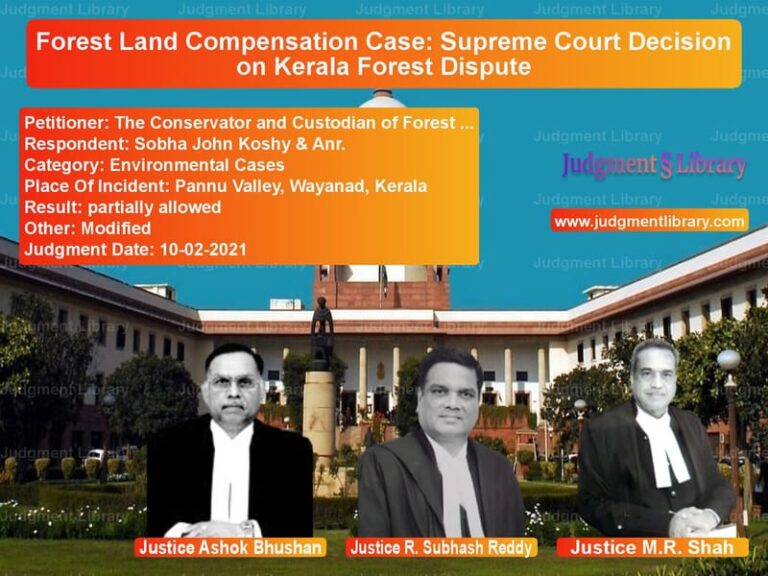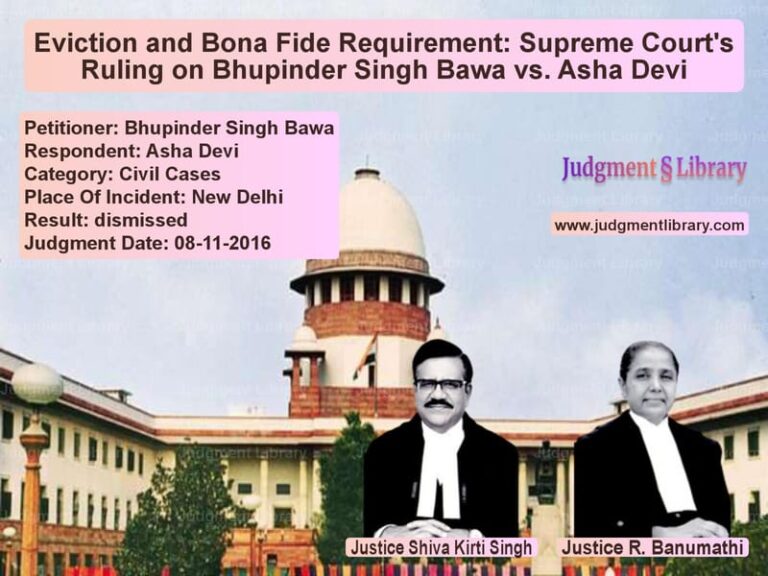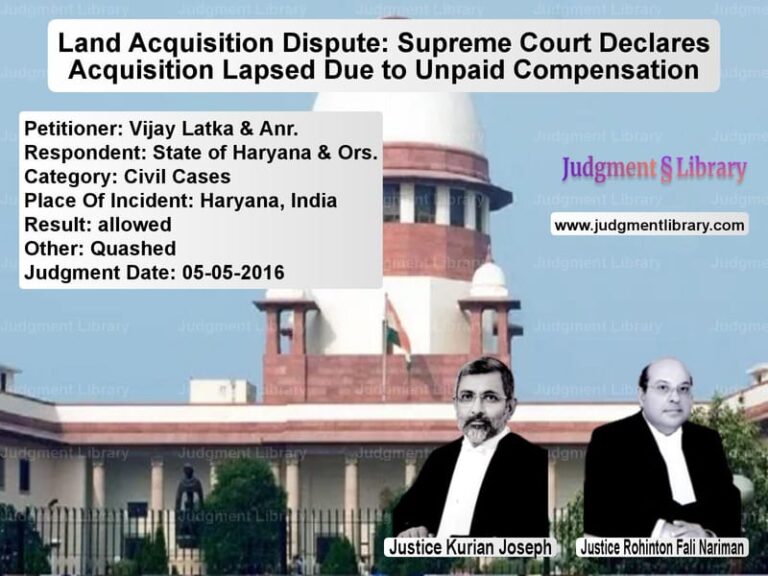Rana Ayyub vs. Enforcement Directorate: Supreme Court Dismisses Territorial Jurisdiction Challenge
The Supreme Court of India recently ruled on a writ petition filed by journalist Rana Ayyub, challenging a summoning order issued by the Special Judge, Anti-Corruption, CBI Court No.1, Ghaziabad. The petition was filed against the Directorate of Enforcement (ED) in connection with a money laundering case related to crowdfunding campaigns. The Court dismissed the petition, allowing the trial to proceed in Ghaziabad.
Background of the Case
Rana Ayyub, a journalist, initiated three crowdfunding campaigns between April 2020 and September 2021 on the online platform “Ketto.” The funds were collected for COVID-19 relief efforts. However, an investigation was launched against her by the Enforcement Directorate under the Foreign Exchange Management Act (FEMA), 1999, and later under the Prevention of Money Laundering Act (PMLA), 2002.
A complaint was lodged against Ayyub by an individual named Vikas Sankritayan, the founder of the Hindu IT Cell, alleging misappropriation of funds under Sections 403, 406, 418, and 420 of the Indian Penal Code (IPC), Section 66D of the Information Technology (Amendment) Act, 2008, and Section 4 of the Black Money Act. Based on this complaint, the ED initiated an investigation, leading to the attachment of Ayyub’s bank account in Navi Mumbai, Maharashtra.
The Special Judge in Ghaziabad issued a summoning order against Ayyub on November 29, 2022, directing her to appear on December 13, 2022. Ayyub challenged this order under Article 32 of the Constitution, arguing that the trial should be held in Maharashtra, where her bank account was located.
Petitioner’s Arguments
Represented by senior counsel Ms. Vrinda Grover, Ayyub’s primary argument was that the Special Court in Ghaziabad lacked territorial jurisdiction over the case. Her arguments were:
- Under Section 44(1) of the PMLA, a money laundering case must be tried by a Special Court in the jurisdiction where the offense was committed.
- The funds in question were collected online and deposited in a bank account in Navi Mumbai, Maharashtra. Thus, any alleged offense of money laundering should be tried in Maharashtra.
- The ED’s actions in filing the complaint in Ghaziabad were arbitrary and amounted to forum shopping.
- She had already obtained relief from the Delhi High Court, which quashed a lookout circular issued against her and restrained the ED from taking further coercive action.
Respondent’s Arguments
The Solicitor General of India, Mr. Tushar Mehta, representing the Directorate of Enforcement, argued:
- The complaint against Ayyub was based on an FIR registered in Indirapuram Police Station, Ghaziabad, which gave the Special Court in Ghaziabad jurisdiction over the matter.
- The money collected via crowdfunding was from people across the country, including those within the jurisdiction of Ghaziabad.
- The offense of money laundering does not occur in a single location—it involves multiple stages such as acquisition, possession, use, and concealment of proceeds of crime, making jurisdiction more flexible.
- The PMLA allows Special Courts to try both money laundering cases and scheduled offenses, which in this case included fraud allegations under the IPC.
Supreme Court’s Judgment
The Supreme Court, after analyzing the arguments, ruled against Ayyub’s petition. The key points of the judgment were:
- Section 44(1) of the PMLA allows a Special Court to try money laundering offenses in the area where the crime occurred.
- Money laundering involves multiple activities such as possession, concealment, and use of proceeds of crime. The court noted that since crowdfunding involved donors from various locations, the place of the crime was not limited to Navi Mumbai.
- The complaint against Ayyub was based on an FIR registered in Ghaziabad, making the Special Court there a valid forum for the case.
- Jurisdictional issues in criminal trials require an examination of evidence, which cannot be determined in a writ petition under Article 32.
- The petitioner could raise the jurisdictional objection before the trial court in Ghaziabad.
The Court concluded that “the issue of territorial jurisdiction cannot be decided in a writ petition, especially when there is a serious factual dispute about the place/places of commission of the offense.”
Implications of the Ruling
This ruling establishes key principles in money laundering cases:
- Jurisdiction in PMLA cases is flexible and not restricted to a single location.
- Challenges to territorial jurisdiction should be raised during the trial rather than through writ petitions.
- Online transactions complicate jurisdiction, as crimes may involve multiple locations.
With this ruling, the trial in the money laundering case against Rana Ayyub will proceed in Ghaziabad unless she successfully challenges jurisdiction in the trial court.
Petitioner Name: Rana Ayyub.Respondent Name: Directorate of Enforcement.Judgment By: Justice V. Ramasubramanian, Justice J.B. Pardiwala.Place Of Incident: Ghaziabad, Uttar Pradesh.Judgment Date: 07-02-2023.
Don’t miss out on the full details! Download the complete judgment in PDF format below and gain valuable insights instantly!
Download Judgment: rana-ayyub-vs-directorate-of-enfor-supreme-court-of-india-judgment-dated-07-02-2023.pdf
Directly Download Judgment: Directly download this Judgment
See all petitions in Money Laundering Cases
See all petitions in Fraud and Forgery
See all petitions in Cyber Crimes
See all petitions in Bail and Anticipatory Bail
See all petitions in Attempt to Murder Cases
See all petitions in Judgment by V. Ramasubramanian
See all petitions in Judgment by J.B. Pardiwala
See all petitions in dismissed
See all petitions in supreme court of India judgments February 2023
See all petitions in 2023 judgments
See all posts in Criminal Cases Category
See all allowed petitions in Criminal Cases Category
See all Dismissed petitions in Criminal Cases Category
See all partially allowed petitions in Criminal Cases Category






